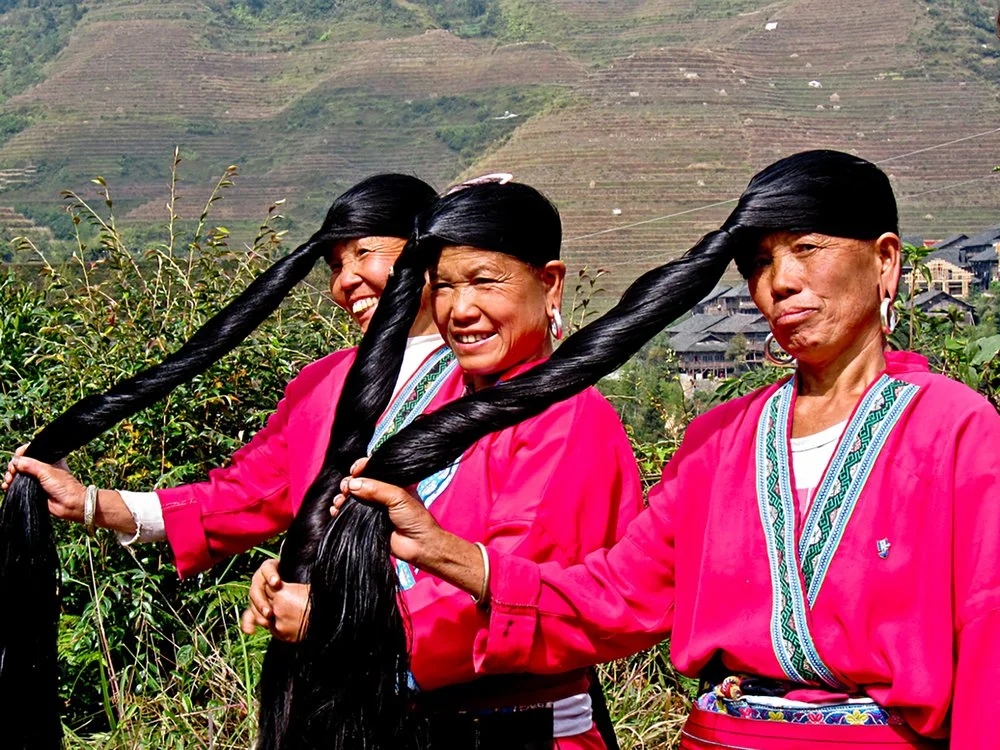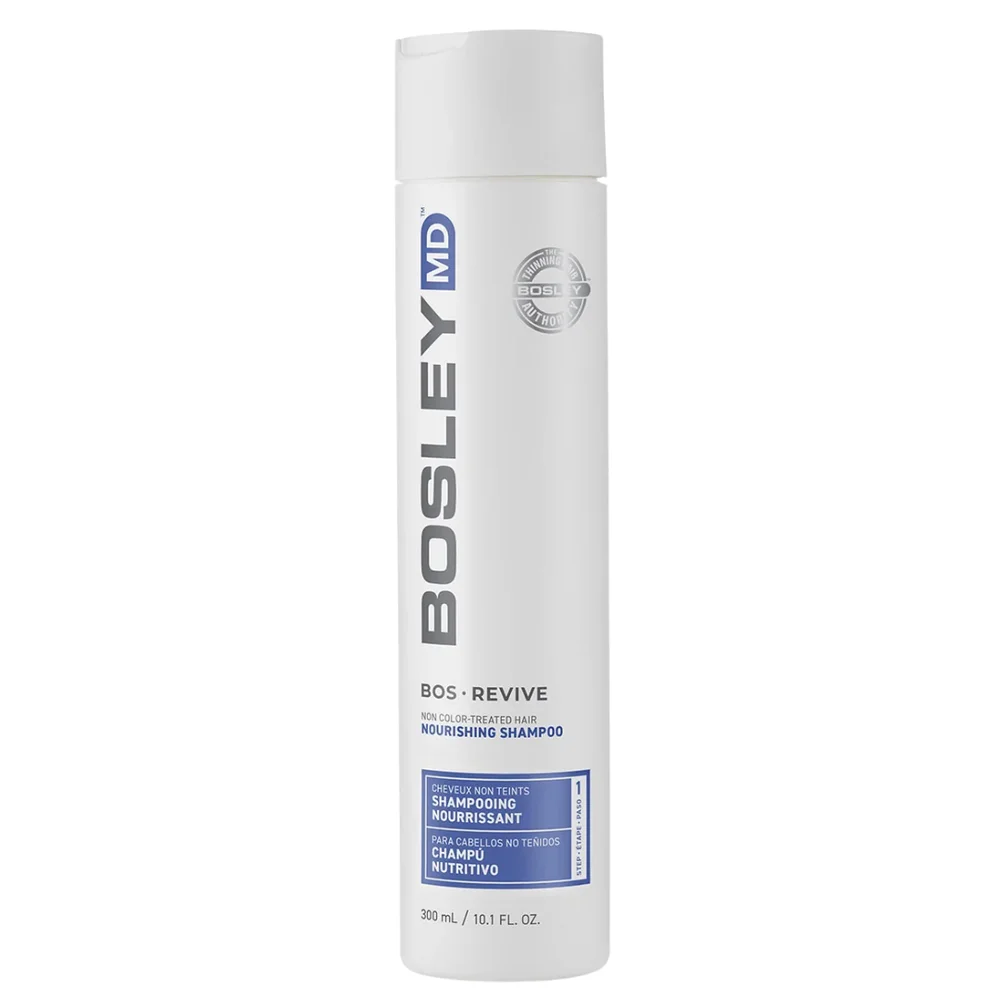Heads up! We may use affiliate links in this post. You'll never pay more, but we might earn a small commission if you buy - thanks for supporting us! See our full disclosure here.
When it comes to beauty and wellness, nature often holds the most powerful solutions!
As someone who gravitates toward natural alternatives – from the food on my plate to the products in my skincare routine – I couldn’t help but be fascinated by an ancient hair growth remedy that’s been making waves: rice water.
While TikTok tutorials and YouTube videos have only recently catapulted this milky elixir into Western beauty consciousness, its story stretches back centuries.
Long before it became a viral sensation, rice water was the closely guarded beauty secret of women across Asia who were renowned for their extraordinary hair length and shine.
This isn’t just another fleeting hair growth trend. Unlike many modern hair growth solutions that come with hefty price tags and lengthy ingredient lists, rice water represents something different: a time-tested, single-ingredient treatment that has earned its place in beauty history through generations of use.
The Ancient Roots of Rice Water

This ‘Rapunzel’ hack is a beauty secret that has been turning heads for centuries. Literally.
Japanese women of the Heian Period (794-1185 AD) had floor-length, glossy hair, all thanks to Yu-Su-Ru (their rice water rinse).
According to a 2010 study in the International Journal of Cosmetic Science, this wasn’t just a coincidence – rice water significantly increases hair elasticity and reduces surface friction.
The Science Behind the Magic: How Does Rice Water Actually Work?
Think of rice water as a nutrient cocktail for your hair. Here’s what makes it so powerful:
- Amino proteins
- Vitamin E
- B vitamins
- Minerals
- Amino acids
- Antioxidants
In fact, rice water contains a remarkable antioxidant inositol that actively promotes hair growth while nourishing your strands from root to tip.
According to Healthline, studies have found that inositol is able to penetrate damaged hair and repair it from the inside out. It even protects hair from future damage.
What Is The Best Rice To Make Rice Water?
Both conventional and organic rice will contain some amounts of fertilisers and pesticides!
So if you want to avoid that exposure altogether, Mielle Organics suggests using Basmati rice, “It’s imported from countries like India and Pakistan, and they don’t have the arsenic problem.”
The Truth About Possible Side Effects: What You Need to Know
To keep it real – rice water isn’t for everyone. Some people experience:
- Dryness
- Protein overload
- Scalp buildup
- Breakage
This typically affects those with low porosity hair, due to rice’s high starch content. Don’t worry though – you can still use it! Just limit the application to once weekly!
Want to find out more about low-porosity hair? Check out these posts:
- Stay Away From Coconut Oil, Shea Butter, Mineral Oil And Olive Oil If You Have Low Porosity Hair, Here’s Why
- 5 DIY Hair Masks For Low Porosity Hair
- Got Low Porosity Hair? These Are The Best Oils To Use!
DIY Rice Water Treatment: Step-by-Step Guide
STEP 1: Rinse the rice
Take 1/2 a cup of rice and rinse with water to remove impurities such as dirt and dust. You can use a strainer for this.
STEP 2: Soak the rice
Using two to three cups of water, stir the rice in a bowl and leave to soak for 30 minutes until the water becomes cloudy (but it can be left for up to 24 hours).
STEP 3: Strain the rice
After you’ve allowed your rice to soak, strain it and keep the water in either a plastic container or a mason jar.
STEP 4: Shampoo
Next, shampoo your hair. You may want to try using a sulphate-free shampoo if you suffer from dryness or have colour-treated hair.
STEP 5: Apply the rice water
When you’ve rinsed out the shampoo, apply the rice water (as you would conditioner) massaging it gently into your scalp and hair strands. Leave it on for 20 minutes.
STEP 6: Finish with a conditioner
After you’ve thoroughly rinsed your hair, complete this routine with a good hair conditioner of your choice.
💡 Storage Tip: Keep your rice water in the refrigerator and use within 7 days. If it smells funky, make a fresh batch!
Ready-Made Alternatives: Top 5 Rice Water Products
For those busy days when DIY isn’t an option, here’s a round-up of 5 of the best rice water-infused products on the market:
1. Shea Moisture Strength + Color Care Shampoo

Pros:
- Great for colour-treated hair
- Contains organic Shea Butter
- Additional moisturising ingredients
Cons:
- May be heavy for fine hair
- Strong fragrance
Best for: Colour-treated, damaged hair
If you have colour-treated hair you may find that it has become brittle. Purple Rice Water Strength + Color Care Shampoo restores hair to a more vital, healthier state.
This mineral-rich cleanser with rice extract, wild orchid and sweet violet extract will remove residue and restore shine and strength to hair. This rich blend includes certified organic Shea Butter, Argan Oil, and Jojoba Oil for extra luxurious moisturising.
2. Mielle Rice Water Moisturizing Milk

Pros:
- Lightweight formula
- Daily use approved
- Multiple natural oils
- Easy to apply
- Cost-effective
Cons:
- Strong scent
- Can leave residue on fine hair
Best for: Daily moisture maintenance
Daily use of this moisturiser will revive dry hair, as well as strengthen and add shine to your hair.
As well as rice water, safflower oil, yuzu, castor oil, and coconut oil, safflower oil helps lock in moisture.
3. Briogeo Don’t Despair, Repair!™ Megastrength+ Rice Water Protein Treatment

Pros:
- 98% natural ingredients
- Scientifically proven results
- Immediate strengthening effects
- Balanced protein-moisture formula
Cons:
- Higher price point
- Small bottle size
Best for: Intensive damage repair
Don’t Despair, Repair!™ from Briogeo has a balanced combination of rice water protein and moisture which is incorporated into this dual-action formula for healthy hair.
In addition to protecting your hair from future damage, the rice protein complex hydrates it deeply to nurture dry, brittle hair and maintain elasticity.
4. Replenhair Rice Water Hair Moisturiser Spray

Pros:
- Convenient spray format
- Free from sulphates and parabens
- Antioxidant-rich formula
- Easy to layer with other products
Cons:
- May need frequent reapplication
Best for: On-the-go moisture boost
With all the amino acids, minerals, and vitamins included in Replenhair’s Rice Water Moisturising Spray you can expect healthy hair and growth. It is also free from sulphates, parabens, and SLS.
Rich in antioxidants that help provide protein for promoting hair growth, this spray will strengthen hair, and add elasticity & shine.
5. Bosley BosRevive Non Color-Treated Hair Nourishing Shampoo

Pros:
- Promotes scalp circulation
- Removes DHT buildup
- Sulphate and paraben-free
- Professional salon quality
Cons:
- Premium price point
- Results take time to show
Best For: Thinning hair concerns
This sulphate-free and paraben-free shampoo is perfect for colour-treated hair.
A combination of rice amino acids, pumpkin seed extract and saw palmetto helps to remove build-up, such as DHT from the scalp, increase scalp circulation, and promote healthy hair growth whilst keeping the hair clean and fresh.
Save on Pinterest for later?

FAQs
Q: How often should I use rice water?
A. The ideal frequency for using rice water varies depending on your hair type and condition. For those with normal to oily hair, using rice water once or twice a week usually provides optimal results.
If you have dry or damaged hair, limit your treatments to once per week to avoid protein overload. Those with low porosity hair should be especially careful, using rice water no more than every other week.
For colour-treated hair, a weekly treatment usually strikes the right balance between nourishment and protection.
Q: Can I leave rice water in my hair overnight?
A. While you might be tempted to leave rice water in your hair overnight for maximum benefits, this isn’t recommended.
Extended exposure can lead to protein overload, which might make your hair feel brittle and stiff rather than soft and strong. There’s also a risk of scalp irritation from prolonged contact.
The sweet spot for most people is between 20 to 30 minutes – this gives your hair enough time to absorb the beneficial nutrients without risking adverse effects.
Q: Should I use hot or cold water to make rice water?
A. Room temperature water is your best bet when preparing rice water.
It’s just like making tea for your hair – too hot, and you risk destroying some of the valuable nutrients; too cold, and you might not extract enough of the beneficial properties.
Room-temperature water strikes the perfect balance, creating a stable solution that effectively preserves the nutrients while ensuring proper extraction.
This middle-ground approach helps maintain the integrity of the amino acids and vitamins that make rice water so beneficial for your hair.

